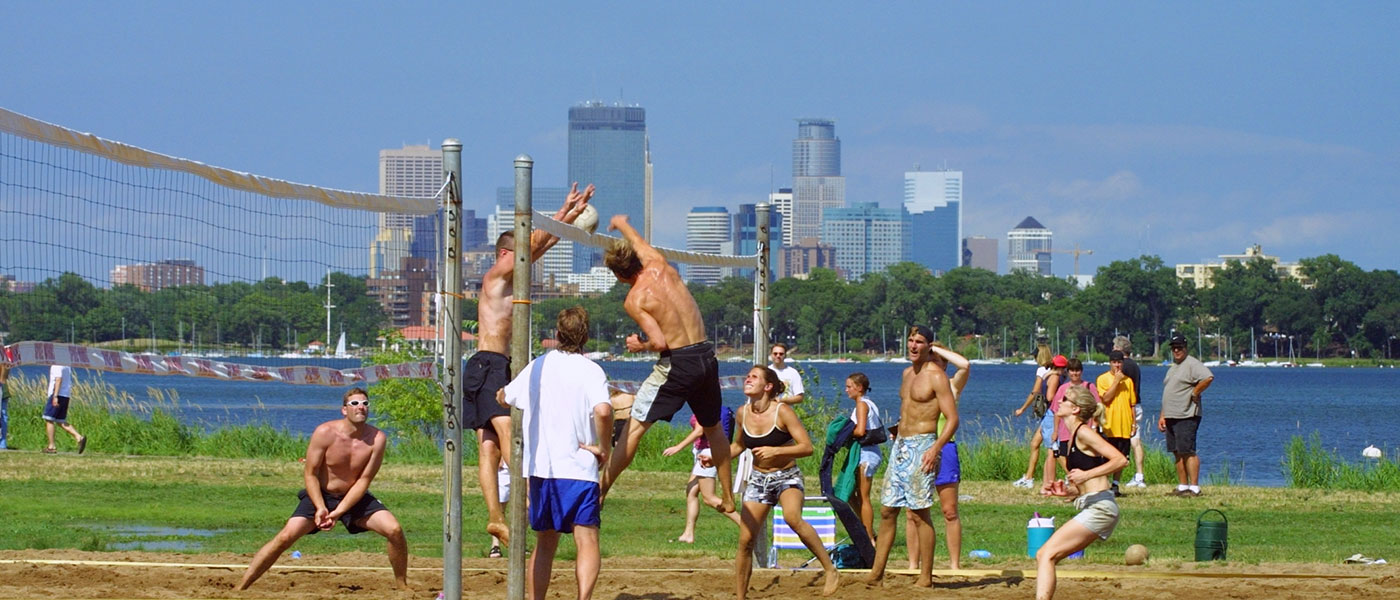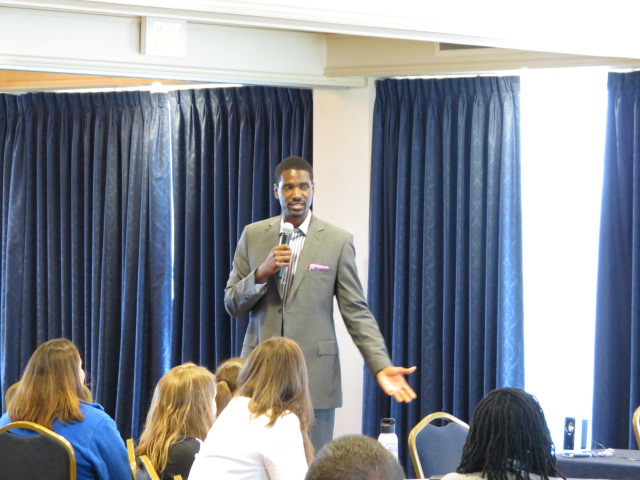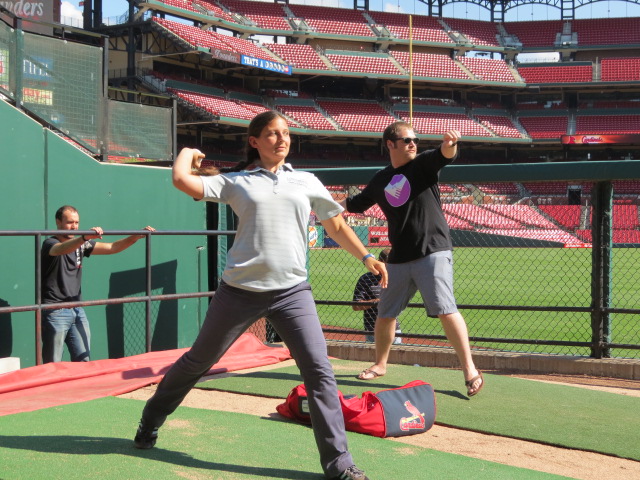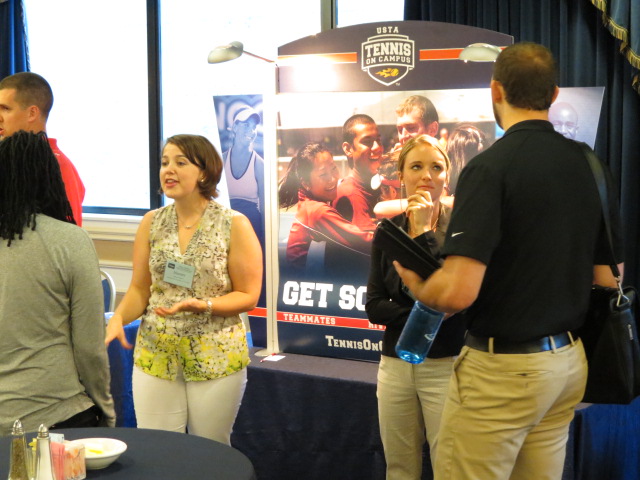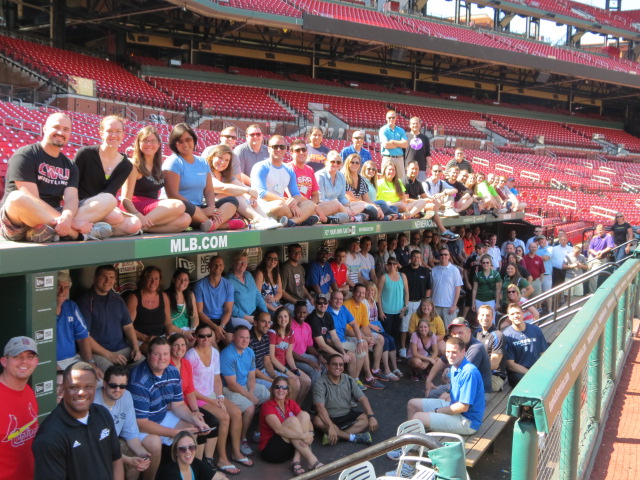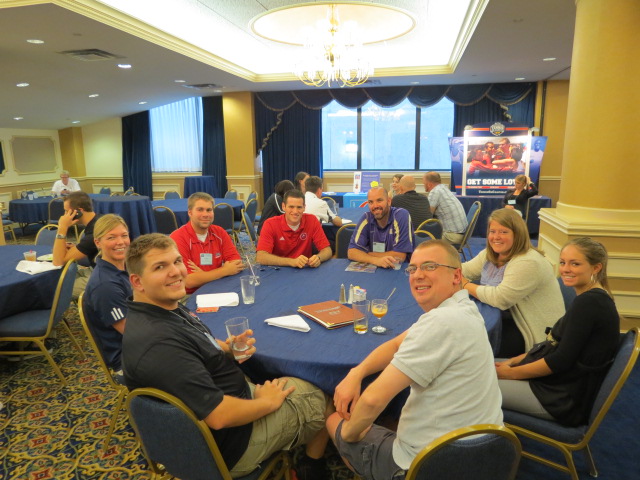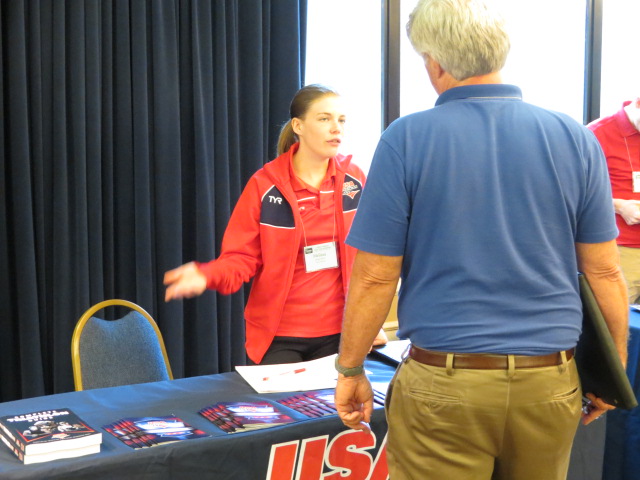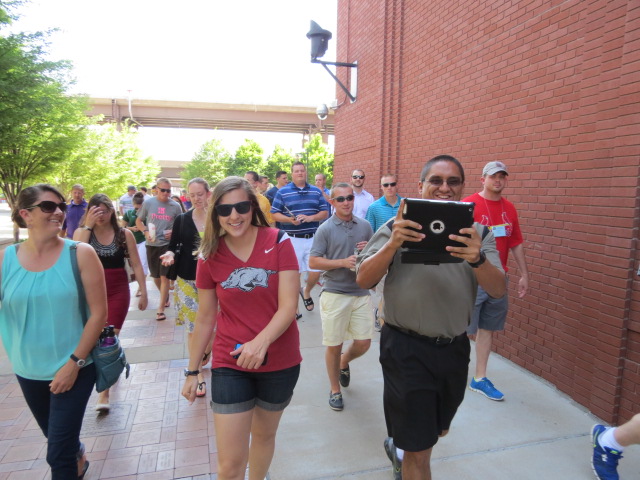2015 NIRSA Collegiate Sport Club Institute
June 10-12, 2015 • Minneapolis, Minnesota
Hotel & Travel
Attendees should make reservations for the Crowne Plaza Hotel by calling (800) 593-5708 and requesting the NIRSA rate or register online by using this link 2015 Collegiate Sport Club Institute.
We filled the NIRSA room block! Additional discounted rooms have been secured at a new rate:
Single/double is $199+tax/night.
To receive the discounted group rate, reservations must be made no later than Friday, May 15, 2015. Roommate matching will become available closer to the date of the event.
NIRSA encourages all attendees to reserve their hotel accommodations within the NIRSA room block. NIRSA relies on strong room block usage to secure ample meeting space, increase negotiation leverage for future institutes, and offset event expenses
Airport Transportation
Minneapolis Metro Transit: http://www.metrotransit.org or http://maps.google.com
Make your destination:
618 Second Avenue South
Minneapolis, MN 55402
It takes about 21 minutes riding (via metro transit blue line), and 5 minutes walking, to arrive at Crowne Plaza Downtown from Minneapolis-Saint Paul International Airport. The metro runs all hours except between 1am and 3:30am. Be sure to detrain at Government Plaza Station & Platform. The cost is $1.75.
Dining Options
The Crowne Plaza Minneapolis – Northstar Downtown has onsite dining options, but downtown Minneapolis has extensive dining options within blocks of the hotel.
Preconference Events Tuesday, June 9
Bike Tour of Minneapolis, 1:30pm – 4:30pm*
Take advantage of this opportunity to bike around America’s Best Bike City! Lead by University of
Minnesota staff, all bikes, helmets, locks, and emergency supplies will be provided. Attendees will
depart from the Host Hotel.
Night at the Ball Game: Twins vs. Royals, 6:00pm – 9:30pm*
Meet in the host hotel lobby for transportation to Target Field. Price includes ticket to the game and $10 for the concession stand.
*Additional registration required
Keynote Speaker

Mary O’Mahoney became the Director of the Student Recreation Center at California State University Bakersfield in September of 2014. However, most of her career —aside from a brief spell at Illinois State University—developed at the University of Arizona, where she served in a variety of organizational roles during her 23-year tenure in the UA’s Department of Campus Recreation. During that time, Mary served primarily as the Assistant Director of Sport Clubs and Family Programs.
Mary’s pathway into campus recreation started as an undergraduate student at Northern Illinois University, where she earned her Bachelor’s degree in Education. She went on to complete her Master’s in Exercise and Sports Science – Sport Administration at the University of Arizona. As a professional, she has been actively involved in collegiate sport clubs for over twenty years, when she attended her first NIRSA Sport Club Symposium in Columbus, Ohio in 1995. She has served in a number of roles and committees for the NIRSA Championships Series and its predecessor, the NIRSA National Campus Championship Series. She has volunteered at over 15 national sport club championships across a range of sports and also has more than a decade of experience servings as the Region VI Coordinator for NIRSA Championship Series Soccer.
Schedule of Events
Attendees of the NIRSA Sport Club Institute will learn about new trends, unique programming, management techniques, and more in the field of collegiate sport clubs; this is achieved through an engaging blend of educational sessions, roundtable discussions, and networking opportunities.
Check out the schedule overview and session information (schedule subject to change)!
Registration
Time: 8:00am-9:45am
Welcome & Keynote
Presenter: Mary O’Mahoney
Description: Mary’s keynote address “The Story of Us” tells the tale of how sport club professionals are impacted through our professional involvement with sport clubs. She also makes clear the impact we have on the individual and club levels, highlights the value we bring to our university campuses, and reflects on the dynamic culture of sport clubs and how they continue to evolve over time.
Room: Great Lakes Ballroom
Time: 10:00am-11:15am
Lunch Bunch
Time: Noon-2:00pm
Description: A past favorite activity, the Lunch Bunch is a networking opportunity for attendees to meet new people in your field and make a connection! Any interested attendees should meet outside the Ballroom following the Welcome & Keynote to get matched into groups of 6-10 attendees. A list of local restaurants and some icebreaker questions will be supplied in your attendee packet. Lunch is paid for on your own.
Transgender Participant Inclusion: Resources for Working with the LGBTQ Community
Presenters: Wendy Motch, UCLA; Navin Caple, Brac{he the Silence; Shane Windmeyer, Campus Pride
Room: Great Lakes Ballroom
Time: 1:30pm-3:00pm
Core Competencies: Philosophy & Theory, Programming, Personal & Professional Qualities
Topic: Program/Facility Management, Equity, Diversity, and Inclusion
Description: Participants will learn about gender identity; NIRSA’s new Transgender Athlete Participation policy; the Campus Pride Index; benchmarks for LGBTQ inclusion in collegiate recreation and intercollegiate athletics; and Coaches Corner, a website and comprehensive resource for LGBTQ inclusion in sports. Coaches and athletic administrators at all levels of sport will learn about resources aimed at creating more inclusive communities and improving the experiences of student-athletes and athletic professionals.
Learning Objectives:
- Understand NIRSA’s Transgender Athlete Participation policy.
- Be able to articulate basic terminology around transgender inclusion, and understand gender identity as a different construct from sexual orientation.
- Learn about resources that you can use to create best practices for working with LGBTQ participants.
Executive Committees: To Infinity and Beyond!
Presenters: Elise Harvey, University of Georgia; Beth Goldenberg, University of New Hampshire; Kelsey Orrill, University of Arkansas; Brian Scott, University of New Hampshire; Laura Thomas, Texas Tech University
Room: Great Lakes Ballroom
Time: 3:15pm-4:15pm
Core Competencies: Philosophy & Theory, Programming
Topic: Philosophy
Description: Are you thinking about creating a student board for your club sports program? In this presentation, attendees will learn about strategies for starting and sustaining an effective Sport Club Executive Committee using benchmarking and the development of student leaders through active engagement and goal setting. We will reflect on what we do in our programs and the successes and challenges that we have faced through our experiences.
Learning Objectives:
- Learn strategies for creating, implementing, and advancing a student board for your club sports program.
- Learn techniques for benchmarking executive committee processes and how to apply ideas within the scope of your specific program.
- Learn about the risks and benefits of involving student members of executive committees in programmatic decision making.
How Well Do You Know Your Clubs?
Presenters: Shannon Vaccaro, University of Nebraska-Lincoln; Chad Schultz, University of Wisconsin-Madison
Room: Calhoun
Time: 3:15pm-4:15pm
Core Competencies: Philosophy & Theory, Programming, Business Management, Legal Liability & Risk Management
Topic: Sport Clubs
Description: Performing a sport club audit can help administrators get to know their clubs better. An internal review or audit can provide valuable information about the membership, club operations and culture, and financial stability and procedures. It can also help administrators identify areas of risk as clubs are becoming increasingly scrutinized through the university or college administrative lens. Learn how to take a proactive approach to ensuring good club operating standards as well as how to minimize risk by conducting a thorough review of your club program.
Learning Objectives:
- Learn at least two benefits of conducting an internal audit on clubs.
- Be able to identify at least three common working themes within all clubs in your program.
Sport Club Skills Roundtable
Presenters: Jean Holt, Old Dominion University
Room: Great Lakes Ballroom
Time: 4:30pm-5:30pm
Topic: Personal & Professional Qualities
Description: Many Sport Club graduate assistants come to us from intramurals or facilities. What skills and experiences are beneficial for undergraduate students to obtain in order for them to be prepared for a sport club graduate assistantship?
Registration
Time: 7:30am-8:30am
Building a Framework for a Club Sport Program
Presenters: Heidi Potratz, Kennesaw State University; Laura St. Onge, Kennesaw State University
Room: Great Lakes Ballroom
Time: 8:30am-10:45am, built in 15 min break
Core Competencies: Philosophy & Theory, Programming, Legal Liability & Risk Management
Topic: Program/Facility Management
Description: Starting a club sports program from scratch can be an overwhelming task. Learn how to build a strong foundation for long-term success.
Learning Objectives:
- Be able to articulate a mission and philosophy statement for your club sports program.
- Learn the five key risk management components of a club sports program.
- Learn the six fundamental operational components of a club sports program.
Club Sports: From Rec Clubs to NCAA Division IV
Presenters: Joshua Hamilton, University of Southern California; John Tomlinson, University of Southern California
Room: Calhoun
Time: 8:30am-9:30am
Core Competencies: Philosophy & Theory, Personal & Professional Qualities
Topic: Philosophy
Description: Given the continuing evolution of club sports, attendees at this presentation will learn about how club sport programs and coordinators are turning towards a competitive sport model, tearing down recreational-tier systems, and becoming more like NCAA Athletic Directors in the process.
Learning Objectives:
- Learn how club sports evolved from a recreational and social experience to a more competitive experience.
Utilizing Partners in your Community: How UCF Capitalized on a Relationship with the U.S. Marine Corps.
Presenters: Pamela Grega, University of Central Florida
Room: Calhoun
Time: 9:45am-10:45am
Core Competencies: Programming, Personal & Professional Qualities
Topic: Personal & Professional Qualities
Description: Community collaboration among sport club programs remains an underlying thread of conversation in recreation programs across the country. Some common concerns surrounding the topic are regarding the benefits, the logistics and necessity of initiative, and how to ensure a productive use of time for everyone involved. The University of Central Florida Sport Club Council addressed the need for collaboration with the Orlando community by building a relationship with the Marine Officer Selection Office of Orlando. This session will not only share the success of the relationship between the UCF Sport Club Council and the Marines, but will also inform participants of how to reach out to their own communities to build mutually-beneficial relationships.
Learning Objectives:
- Be able to identify the benefits that community collaboration can have for a sport club program.
- Be able to articulate what a mutually-beneficial relationship between a sport club program and a community group should look like.
- Design an initial plan to communicate and build a relationship with a community group.
The Legal Implications of Hazing: What Legal Responsibilities Does an Administrator Have?
Presenters: Ryan Bradshaw, George Mason University
Room: Great Lakes Ballroom
Time: 11:00am-Noon
Core Competencies: Legal Liability & Risk Management
Topic: Legal Liability & Risk Management
Description: Hazing is a hot topic across the continent, garnering quite a bit of media attention. Unfortunately, club sports continue to be among the top three types of campus groups whose members—almost six in ten—report being hazed during some point of their involvement. As an administrator or student leader, do you know what your legal obligations are if you become aware that hazing is occurring? This presentation will utilize two case studies recently seen in the headlines to explore the potential legal ramifications of hazing for both students involved in hazing and for administrators overseeing programs in which hazing is taking place. Techniques to stop hazing will also be discussed.
Learning Objectives:
- Learn where to find hazing statutes applicable to your state.
- Be able to define your duty to act as dictated by federal statutes.
- Learn two best practices to help prevent hazing on your campus.
Sport Clubs Budgets: The Expenses and Potential Revenue Sources of a Comprehensive Program
Presenters: Michael Forbes, Duke University; Jeremy Fritz, Duke University
Room: Calhoun
Time: 11:00am-Noon
Core Competencies: Business Management
Topic: Business Procedures
Description: This session offers budget training for sport clubs officers. Attendees will learn how to prepare a comprehensive sport club operating budget. The presentation will go over a variety of factors that need to be considered in preparing a thorough and realistic budget and both expenses and revenue sources will be discussed.
Learning Objectives:
- Be able to identity income sources like fundraising, dues, university contributions, sponsorships, endowments, etc.
- Be able to articulate what a mutually-beneficial relationship between a sport club program and a community group should look like.
- Be able to write a budget for individual clubs as well as the overall program, and to distinguish individual club expenses like travel and equipment from total program expenses like salary, office supplies, and laundry.
T-Shirt Exchange
Time: 12:00pm-12:30pm
Description: Represent your school and clubs by participating in the Sport Club Institute T-Shirt Exchange. All you have to do is bring one – or a few – t-shirts from your various campus recreation events or programs and exchange them with colleagues!
Lunch
Time: 12:30pm-2:00pm
Lunch is on your own. There are many restaurants in the area; check out your attendee packet for some nearby choices
Sports-Related Concussions in University Sport Clubs and Intramural Activities
Presenters: Paula Davis-Huffman, Florida Gulf Coast University; Julia Stulock, Florida Gulf Coast University
Room: Great Lakes Ballroom
Time: 2:00pm-3:00pm
Core Competencies: Research & Evaluation
Topic: Research & Evaluation
Description: An abundance of research and treatment recommendations exist for sports-related concussions (SRC) in children (0-18), NCAA athletes, and professional athletes. Unfortunately, research regarding SRC in college sport clubs and intramural activities is lacking. This session will review research that was conducted on a southeastern college campus related to SRC in sport clubs student-athletes and intramural participants. Attendees will also learn about SRC treatment recommendations for this demographic.
Learning Objectives:
- Understand the relationships between traumatic brain injury (TBI), mild traumatic brain injury (mTBI), and sports-related concussion (SRC).
- Be able to identify the potential mental health issues, risks, and impairments related to mTBI and SRC as well as identification tools and professional treatment recommendations for them.
- Apply cost-effective recommendations to improve the recognition and management of sports-related concussion in sport clubs student-athetes and intramural participants.
Taking Your Program from Good to Great: Implementing Change
Presenters: Jenny Larson, University of Wisconsin-La Crosse; Amanda Alpert, University of Mississippi
Room: Calhoun
Time: 2:00pm-3:00pm
Core Competencies: Philosophy & Theory, Programming, Personal & Professional Qualities
Topic: Philosophy
Description: New sport club professionals, eager to make their mark on their programs, are coming into the campus recreation profession every day. At this session, presenters will share the challenges they faced in taking their programs from good to great as well as stories of their successes. They will also outline how they stay with or ahead of industry trends; touch on learning the culture of their sport club program; discuss how to evaluate programs; and talk about the process of executing new ideas, projects, and programs with sport club officers and participants.
Learning Objectives:
- Be able to evaluate how your program utilized resources—student participants, leadership council, professional staff—before you started your position, and what changes can now be made.
- Learn how to identify potential areas of change in your sport club program and what steps you can take to implement change and keep up with industry trends.
- Learn about new and innovative ideas that fellow sport club professionals have implemented on their campuses as well as the successes and challenges they have faced.
Creative Ways to Utilize Student Staff and Maximize Efficiency
Presenters: Corey Sinclair, Central Washington University
Room: Calhoun
Time: 3:15pm-4:15pm
Core Competencies: Programming
Topic: Program/Facility Management
Description: As sport club coordinators, we all feel stretched thin and have trouble managing daily tasks as well as tackling special projects we want to pursue to improve our programs. This presentation will provide attendees with some systems and creative ways to use student staff to assist with day-to-day tasks, student travel, risk management processes, and large projects. There will also be an opportunity for attendees to dialogue with colleagues and share challenges, ideas, and solutions in small groups.
Learning Objectives:
- Learn several creative ways to utilize student staff to assist with emergency response while clubs are traveling.
- Learn how to utilize student staff to assist with publicity, event planning, and special projects.
- Learn about current challenges facing sport clubs programs around the country as well as solutions and ideas for tackling those challenges.
National Governing Bodies Roundtable
Room: Great Lakes Ballroom
Time: 4:30pm-5:30pm
Description: With clubs around the country looking for more and more structured leagues and tournaments, National Governing Bodies (NGBs) are some of the largest providers of these structured leagues. But who are these organizations, what are their goals, and what role do they play in the future of Club Sports? This roundtable will feature representatives of NGBs around the country in an open forum small table discussions to answer these and any other questions you may have.
Networking Social & Expo
Room: Skygarden
Time: 6:00pm-8:00pm
Description: Let the conversations from the NGB Roundtable continue over dinner at the Networking Social & Expo. Attendees and NGB participants can enjoy a buffet dinner while networking and viewing NGB tabletop displays.
Sport Club Roundtable
Room: Great Lakes Ballroom
Time: 9:00am-10:00am
Description: The conference is almost wrapped up! You’ve heard a lot of quality presentations and have had a lot of great discussions, but you still have a few more questions you want to answer before you head back to campus. This roundtable is an opportunity to continue any of those relevant discussions with the larger group or to seek answers for any final questions you may have.
Club Sports and Collecting Data: How to Get Your ASSessment Moving!
Presenters: Justin Waters, East Carolina University
Room: Great Lakes Ballroom
Time: 10:15am-11:15am
Core Competencies: Programming, Research & Evaluation
Topic: Research & Evaluation
Description: As sport club professionals, we are constantly validating our increasing budgets to upper administration; we often need to provide the “why” in support of the “how” when it comes to finding resources for our sport clubs. This session will offer ideas and examples of data collection regarding sport club athletes as well as on how sport clubs affect a student’s overall university experience for the better.
Learning Objectives:
- Be able to identify simple techniques for gathering information on club sports athletes.
- Learn about current survey tools like community involvement, economic impact, the carbon footprint calculator, and university selection and retention rates.
- Learn how to utilize the information you have collected to market your specific sport club program.
Outside the Lines: Providing Club Athletes with Life Skills
Presenters: Andrew Rampe, University of North Carolina Wilmington
Room: Calhoun
Time: 10:15am-11:15am
Core Competencies: Philosophy & Theory, Programming, Legal Liability & Risk Management
Topic: Philosophy
Description: Additional emphasis is now placed on what students learn outside the classroom to prepare them for life after their college careers—and every year, across the nation, thousands of student athletes participate in sport clubs. Discover how sport club programs can create leaders inside and outside the lines. Learn how to create risk management practices and leadership series as well as how to develop transferable skills in your student athletes as they progress through their college careers.
Learning Objectives:
- Be able to identify ways students can learn transferable skills through participation in a sport club.
- Learn risk management practices—culled from situations that may arise during club activities—which can assist club members in learning important transferable skills.
- Learn how to develop a leadership series which allows all club members to build a skill set foundation.
Institute Development Roundtable
Room: Great Lakes Ballroom
Time: 11:30am-Noon
Description: This short roundtable discussion will be geared towards the 2015 NIRSA Collegiate Sport Club Institute; what did you like about the event, where do we have room for improvements, and what’s new and different that you would like to see at this event in the future. Your feedback is valued and necessary for the Committee and NIRSA Headquarters to improve this event—so come share your thoughts!
Please don’t forget to also complete the post event survey that will be emailed to attendees on Monday, June 15
Thank you and we hope to see you at the next NIRSA Collegiate Sport Club Institute in 2017
Registration Pricing
| Prices | Early Bird Rate
Register by 4/29/15 |
Regular Rate |
|---|---|---|
| Professional/Student Member from a Member Institution | $375 | $445 |
| Additional Member from the same Member Institution | $350 | $420 |
| Professional/Student Member from a Nonmember Institution | $425 | $495 |
| Individual Nonmember from a Member Institution | $510 | $580 |
| Individual Nonmember from a Nonmember Institution | $545 | $615 |
| One Day (Professional/Student Members) | $200 | $270 |
| Associate Member w/ table top exhibit | $600 | $670 |
| Associate Member attending only | $450 | $520 |
| Associate Member exhibiting only | $300 | $370 |
| Additional Associate Member | $200 | $270 |
| Company Nonmember w/ table top exhibit | $850 | $920 |
| Company Nonmember attending only | $600 | $670 |
| Company Nonmember exhibiting only | $500 | $570 |
| Additional Company Nonmember | $300 | $370 |
| One Day (Associate Members) | $250 | $320 |
Sponsor the Sport Club Institute!
Want to sponsor the 2015 NIRSA Sport Club Institute? Contact Heidi Cleary for available sponsorship opportunities.
National Governing Bodies
NIRSA is hoping to grow National Governing Body participation in the 2015 Collegiate Sport Club Institute and will be inviting NGBs to share the following with Institute attendees: their goals, rules and policies, student development practices, budget information, league and national tournament information, current practices in risk management, levels of communication, and student expectations.
In 2013, nearly 130 attendees and representatives from eight National Governing Bodies took part in the NIRSA Collegiate Sport Club Symposium in St. Louis, Missouri.
As an NGB, it was extremely advantageous to my sport’s development to learn what sport club directors face every day, as well as network with the individuals that make sport clubs happen across the country.
The NIRSA Collegiate Sport Club Symposium was a great experience for my colleague and me. We learned so much from the programming and were able to build relationships with sport club professionals that will be extremely valuable to our teams and our organization as we continue to grow. We look forward to working with NIRSA in the future and hope to return to future Sport Club Symposiums.
I brought 4 of our Sport Club Executive Board members to the SCS. They are so pumped for next year! This was a great opportunity for them to see another side of the Sport Club “business”!
Who Should Attend?
The NIRSA Collegiate Sport Club Institute delivers valuable information for a wide range of attendees, including:
- Experienced sport club professionals who lead, develop, or oversee sport clubs on campuses and are interested in revitalizing their programs
- New sport club professionals who are interested in learning more about developing collegiate sport clubs
- Student leaders who are members or leaders of sport clubs and/or interested in careers related to recreation sports
- Vendors who are looking to showcase their products and network with sport club professionals
- Parks and recreation professionals who organize sports leagues and are interested in enhancing their programs
Photos from 2013
The number of institutions that attended and the broad range of experience administering sport club programs was great. I have been a professional working with sport clubs for more than 10 years. This is the second sport club symposium I have attended and both times I have attended I have left feeling re-energized, inspired and excited to go back to campus and share what I learned.
This was the most beneficial NIRSA event I have ever attended in regards to improving my program. I believe that is because it was Sport Clubs and Sport Clubs only. Our program is the wild child and it was extremely helpful to hear what everyone else was doing on important topics that pertain to my program!
It was my first time attending the Sport Club Symposium however I found it very beneficial. It was great way to connect and network with other professionals in your specific field area. It was very educational and will be a great asset to me going forward in my professional development and experience.
2015 Sport Club Institute Committee Members
- Ryan Bradshaw, Committee Chair, George Mason University
- Pamela Grega, University of Central Florida
- Jean Holt, Old Dominion University
- Michael Przydzial, Northern Arizona University
- Brian Stelzer, University of North Carolina Wilmington
- Brittany Rejda, NIRSA Headquarters
Photos on this page courtesy Meet Minneapolis, www.minneapolis.org. Spoonbridge and Cherry by Claes Oldenburg and Coosje ban Bruggen

